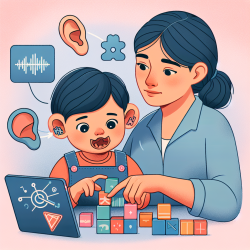Introduction
Parenting styles have long been recognized as significant predictors of child development outcomes. Among these, authoritarian and authoritative parenting styles are often discussed for their contrasting impacts on children. A recent study titled "Authoritarian parenting predicts reduced electrocortical response to observed adolescent offspring rewards" delves into the neural underpinnings of these parenting styles, offering insights that can help practitioners improve their approaches to fostering positive outcomes in children.
Understanding the Research
The study explored how different parenting styles influence parents' neural responses to their children's successes and failures. By examining event-related potentials (ERPs) in parent-adolescent dyads, the researchers found that authoritarian parenting is associated with a reduced electrocortical response to observing adolescent rewards. This diminished response, termed observational Reward Positivity (RewP), suggests a lack of empathy and engagement in the child's positive experiences.
Conversely, authoritative parenting, characterized by high responsiveness and demandingness, was hypothesized to enhance observational RewP, although the study did not find significant associations. These findings highlight the potential neural mechanisms through which parenting styles influence child outcomes, particularly in terms of empathy and reinforcement.
Implications for Practitioners
For practitioners working with families, these findings underscore the importance of fostering empathic engagement in parenting. Here are some strategies to consider:
- Encourage Reflective Parenting: Help parents understand the impact of their responses to their children's successes and failures. Reflective practices can enhance empathy and improve parent-child interactions.
- Promote Positive Reinforcement: Guide parents to focus on reinforcing positive behaviors and achievements in their children, rather than solely correcting negative behaviors.
- Develop Empathy Skills: Offer workshops or resources that teach parents how to better empathize with their children's experiences, fostering a supportive and nurturing environment.
Encouraging Further Research
While this study provides valuable insights, further research is needed to explore the cultural variability in parenting styles and their neural correlates. Understanding how different cultural contexts influence these dynamics can help tailor interventions to diverse populations.
Additionally, examining the long-term outcomes of children exposed to different parenting styles can provide a more comprehensive understanding of how early interventions can mitigate potential negative effects associated with authoritarian parenting.
Conclusion
The research on authoritarian parenting and its impact on neural responses to children's rewards offers a compelling perspective on the importance of empathy and positive reinforcement in parenting. By integrating these insights into practice, practitioners can support parents in creating nurturing environments that foster positive developmental outcomes for their children.
To read the original research paper, please follow this link: Authoritarian parenting predicts reduced electrocortical response to observed adolescent offspring rewards.










